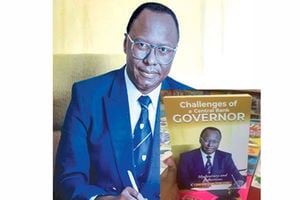
A woman responds to a phone call. The fast-paced nature of switching between roles can lead to stress, fatigue, and burnout. PHOTO/MICHAEL KAKUMIRIZI
As the city hums to life in the early hours, workers begin their daily routines. Some head to a single focused role—dedicating their day to one specialised profession.
Others, however, find themselves in the middle of a balancing act, juggling multiple jobs and shifting responsibilities throughout the day.
The question of whether to specialise in one field or embrace a diverse range of roles is becoming increasingly significant, especially with the rise of the gig economy.
Each path offers distinct advantages and challenges, and in today’s dynamic workforce, the choice often reflects one’s personal and professional priorities.
Specialisation
Specialists are integral to many industries, honing their craft with the precision and dedication of a master artisan.
They focus on one profession, spending years refining a singular skill set, and building expertise that makes them indispensable in their niche.
Ms Shamim Walusimbi, a global recruitment consultant at Aldelia, emphasises the value of this approach: "For roles that require specialised expertise, someone with extensive experience is preferred. The 10,000-hour rule suggests that repeated practice in a specific field leads to mastery."
Indeed, specialists, like surgeons or engineers, command higher respect and salaries in their professions.
The depth of their knowledge allows them to become leaders in their fields, providing stability and long-term growth.
As Ms Walusimbi points out, "Specialists are less likely to make mistakes because they have encountered many scenarios before, and their expertise leads to higher efficiency."
However, with this deep focus comes a potential downside. In fast-changing industries, a highly specialised skill set may become obsolete.
Technological advancements, evolving markets, and global shifts can leave specialists vulnerable if they are unable to adapt. Unlike generalists, who can transition easily between various roles, specialists may find themselves at a disadvantage if their industry faces disruption.
Multiple jobs
On the other side of the spectrum are the jugglers—workers who thrive in variety, balancing multiple roles across different sectors.
One day, they might be a freelance writer; the next, they might switch to a marketing consultant, tutor, or even manage an online business. This constant movement from one job to the next offers a fresh perspective, adaptability, and the ability to thrive in uncertainty.
"The thrill of versatility is intoxicating for some workers," Ms Walusimbi observes. "They are not confined to the limits of one role. With every new gig comes a different challenge, pushing them to learn new skills and approaches."
These professionals adapt quickly to new environments, gathering various experiences that provide flexibility in a rapidly changing economy.
However, juggling multiple jobs is not without its challenges. The fast-paced nature of switching between roles can lead to stress, fatigue, and burnout.
Balancing deadlines, adjusting to different work environments, and maintaining high performance across several roles is demanding. Yet, for those who enjoy variety, the excitement of shifting between tasks outweighs the challenges.
Ms Daphne Kakonge, managing partner at Human Capital Business Solutions, notes that the gig economy has significantly encouraged workers to explore diverse roles.
"The gig economy forces organisations to think differently. Those exposed to diverse environments often have a more adaptable skill set and are better equipped to handle the rapid pace of change in today’s industry," she says.
This flexibility is appealing to younger workers, who value autonomy and the ability to control their work schedules.

A vendor hawks goods along the ever busy Nabugabo Street on August 1, 2024 in Kampala. PHOTO/MICHAEL KAKUMIRIZI
Balancing
While juggling multiple roles might seem chaotic, it offers workers an opportunity to diversify their skill sets and incomes.
As Ms Kakonge highlights, "The largest demographic in many developing countries, including Uganda, is young and technologically savvy. They are open to flexible work arrangements that allow them to contribute to organisations while exploring other opportunities."
This flexibility, however, comes with trade-offs. Multiple gigs often mean less security in terms of long-term employment, healthcare benefits, or career advancement.
Freelancers and contractors, for example, might struggle with the inconsistency of work and the lack of a stable income. Nevertheless, these workers appreciate the freedom to navigate different projects, pursue passions, and develop their expertise in a variety of fields.
According to Ms Walusimbi, for roles that do not require deep specialisation, the broad skills developed by jugglers can be beneficial.
"For tasks like data entry or research, the candidate’s diverse background is less significant. Instead, I look at their soft skills, speed, and critical thinking abilities." She acknowledges, however, that many organisations still prefer candidates with a more focused career trajectory when hiring for roles that require in-depth knowledge.
Impact on career choices
The gig economy is reshaping the traditional approach to employment. As more workers seek out flexible roles, companies are beginning to adapt to the growing demand for short-term contracts and freelance positions. In sectors such as oil and gas, many workers are hired on temporary contracts rather than full-time positions, offering the flexibility needed for project-based work.
Mr Charles Ocici, executive director at Enterprise Uganda, explains that this shift toward flexibility is not always ideal.
"Spreading yourself too thin across multiple domains can dilute your expertise and prevent you from achieving financial success," he warns.
"Establishing credibility in one sector first is crucial before exploring other areas."
Ocici advocates for a balanced approach, particularly for young entrepreneurs. While it is tempting to explore multiple ventures, he advises caution.
"Only after proving yourself in one area should, you consider diversifying. Without a strong track record, spreading resources too thin can lead to financial strain and jeopardise your long-term goals."
Right path
The choice between juggling multiple jobs or specialising in one profession depends on personal preferences, industry demands, and individual career goals. Both approaches offer distinct advantages.
Specialists enjoy the depth of knowledge and stability of mastering a single craft. Meanwhile, jugglers benefit from variety, flexibility, and the ability to pivot quickly in an ever-evolving workforce.
Ms Kakonge emphasises that self-awareness is crucial when navigating today’s job market.
“There is no one-size-fits-all approach. Understanding what motivates you—whether it is the depth of specialisation or the thrill of variety—can guide you toward the right career path,” she explains.
She also points out that juggling multiple jobs is becoming increasingly common, and employers need to adjust to this trend.
"With the high cost of living and modest salaries, people are often forced to take on extra work to support their families," she adds.
However, Ms Walusimbi advises full-time employees who take on side gigs to do so discreetly. “If you are doing additional jobs while employed full-time, it is best to keep it private,” she warns.
For consultants, she recommends tailoring CVs to each job application.
“Many people overload their CVs with too much information, making them appear scattered. It is better to customise your CV to align with the specific role you are applying for,” she advises.
In the end, both specialists and jugglers contribute to the diversity and adaptability of today’s global economy.



